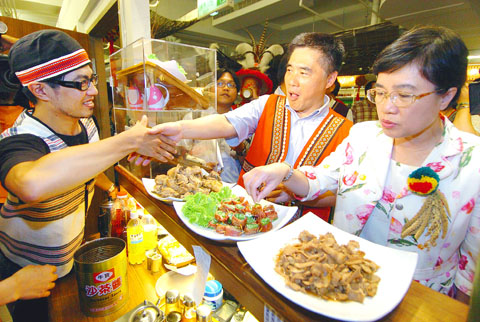Offering a rich blend of innovation, tradition, creativity and originality, a market in Taipei featuring Aboriginal gourmet, farm produce, millet wine, handicrafts and other items was inaugurated yesterday.
The Naruwan Indigenous Peoples’ Market is located not far from Longshan Temple (龍山寺), a popular tourist attraction in Taipei City’s Wanhua District.
Although the market only has 10 shops at the moment, one tour is enough to showcase the rich culture and creativity of Aborigines.

PHOTO: LIAO CHEN-HUEI, TAIPEI TIMES
“When you come here, don’t just shop,” Taipei Mayor Hau Lung-bin (郝龍斌) told a crowd of Taiwanese and foreigners during the inaugural ceremony yesterday afternoon. “Rather, you should try to understand the stories behind these vendors and their culture.”
“There are people who came to Taipei decades ago selling things or serving food on the side of the street — they finally have a storefront. There is a single mother who was struggling to raise her kids and there is a husband who is working to feed his cancer-stricken wife because he remembers the vow he made in church,” he said.
Tseng Chun-yu (曾春玉) is that single mother.
An Aborigine of the Amis tribe, Tseng has had several jobs in the past 20 years since she moved to Taipei from her hometown in Hualien.
She now runs a small coffee and juice bar with her brother and her brother’s two daughters.
“Coffee and juice may not be anything special, but all the fruits I use are grown in Aboriginal areas,” Tseng said. “The coffee beans that I use are also from Aboriginal townships.”
The Haliwan coffee comes from Taitung, the Makutu is from Pingtung and the Pangcah is from Hualien.
“I make very good Pangcah coffee — you have to try it,” Tseng said, smiling.
Next door, an Atayal cook prepares stir-fried wild boar “a l’Atayal” and egg pancake with makau — a spice often used by the Atayal.
Further down is a small Bunun food stand, an Aboriginal handicraft store that offers do-it-yourself courses, a shop selling “sparkling millet wine,” a shop offering organic vegetables and fruit grown by Aborigines, and high-mountain tea from Alishan (阿里山).

WANG RELEASED: A police investigation showed that an organized crime group allegedly taught their clients how to pretend to be sick during medical exams Actor Darren Wang (王大陸) and 11 others were released on bail yesterday, after being questioned for allegedly dodging compulsory military service or forging documents to help others avoid serving. Wang, 33, was catapulted into stardom for his role in the coming-of-age film Our Times (我的少女時代). Lately, he has been focusing on developing his entertainment career in China. The New Taipei District Prosecutors’ Office last month began investigating an organized crime group that is allegedly helping men dodge compulsory military service using falsified documents. Police in New Taipei City Yonghe Precinct at the end of last month arrested the main suspect,

A cat named Mikan (蜜柑) has brought in revenue of more than NT$10 million (US$305,390) for the Kaohsiung MRT last year. Mikan, born on April 4, 2020, was a stray cat before being adopted by personnel of Kaohsiung MRT’s Ciaotou Sugar Refinery Station. Mikan was named after a Japanese term for mandarin orange due to his color and because he looks like an orange when curled up. He was named “station master” of Ciaotou Sugar Refinery Station in September 2020, and has since become famous. With Kaohsiung MRT’s branding, along with the release of a set of cultural and creative products, station master Mikan

Eleven people, including actor Darren Wang (王大陸), were taken into custody today for questioning regarding the evasion of compulsory military service and document forgery, the New Taipei District Prosecutors’ Office said. Eight of the people, including Wang, are suspected of evading military service, while three are suspected of forging medical documents to assist them, the report said. They are all being questioned by police and would later be transferred to the prosecutors’ office for further investigation. Three men surnamed Lee (李), Chang (張) and Lin (林) are suspected of improperly assisting conscripts in changing their military classification from “stand-by

LITTORAL REGIMENTS: The US Marine Corps is transitioning to an ‘island hopping’ strategy to counterattack Beijing’s area denial strategy The US Marine Corps (USMC) has introduced new anti-drone systems to bolster air defense in the Pacific island chain amid growing Chinese military influence in the region, The Telegraph reported on Sunday. The new Marine Air Defense Integrated System (MADIS) Mk 1 is being developed to counter “the growing menace of unmanned aerial systems,” it cited the Marine Corps as saying. China has constructed a powerful defense mechanism in the Pacific Ocean west of the first island chain by deploying weapons such as rockets, submarines and anti-ship missiles — which is part of its anti-access/area denial (A2/AD) strategy against adversaries — the